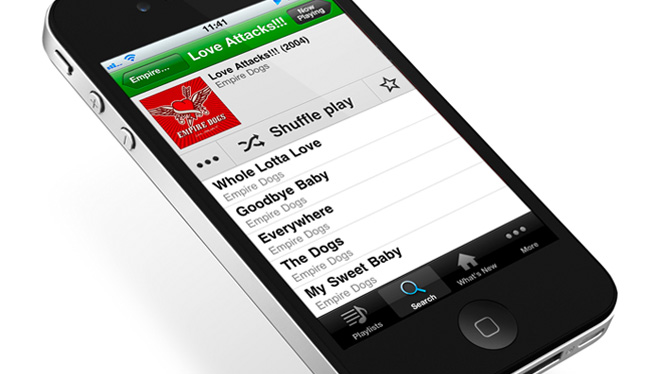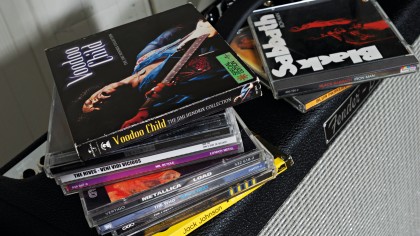Thom Yorke is wrong: Spotify is brilliant for new bands
Even if the money isn't great

Sign up for breaking news, reviews, opinion, top tech deals, and more.
You are now subscribed
Your newsletter sign-up was successful
Welcome to 2013, a golden age of creativity in the music industry. Except that's not what Thom Yorke and his producer Nigel Godrich would have you believe.
The pair have pulled much of their creative work, including Atoms For Peace and Yorke's solo album, The Eraser, from Spotify in a spat over how much the service pays musicians.
It's the latest salvo in a long-running war between between artists and Spotify, the shareholders of which notably include most of the major labels.
For years, bands and labels have withheld their content from the streaming service for a number of reasons, often related to low payments. In many cases, the content has quietly reappeared later on. But Thom Yorke (whose main contribution to the debate quoted the Compare the Market meerkat), is the highest-profile musician to speak out against streaming music.
New Musical Distress
The charges that the pair have levelled revolve not around megastars but around new bands.
"It's bad for new music. New artists get paid fuck all with this model. It's an equation that just doesn't work," Godrich said, adding: "If people had been listening to Spotify instead of buying records in 1973, I doubt very much if [Pink Floyd classic] Dark Side Of The Moon would have been made. It would just be too expensive."
But he's wrong. Spotify is brilliant for new bands and here's why.
Sign up for breaking news, reviews, opinion, top tech deals, and more.
First, it has an insanely low barrier to entry. Getting an album onto Spotify is a trivial task that involves filling out a form on the website of one of zillions of digital distributors and paying a nominal fee - usually about a fiver a year.
Compared to getting an album onto a record shop's shelves, getting played on a major radio station or getting your video on MTV, it has never been easier to expose yourself to an enormous audience - there are no gatekeepers.
And that audience truly is enormous - Spotify has 24 million active users across the world. That's more than the entire population of Australia.
Around 6 million of those pay a monthly subscription fee so they can get ad-free listening or access on their mobile phone. Most musicians write songs because they want to share something with the world - thanks to Spotify (and, to be fair, the web in general) it's never been easier to do that.
Second of all, being on Spotify stops your music being pirated. In 2012, the number of users illegally downloading music on peer-to-peer filesharing sites dropped nearly a fifth.
Spotify founder Daniel Ek has long held that his motivation to create the service was to build something that was better than piracy, and most indications suggest that he's succeeded.
Anecdotally, any Spotify user will tell you privately that they've almost stopped pirating music. The only exception is usually music that isn't available on the service.
Sharing is caring
The third major benefit for new bands of being on Spotify is sharability. The site's playlist, sharing and hyperlinking functionality makes it absolutely trivial to recommend music to friends.
Look - this album is fantastic. That's how easy it is. What's more, the slew of HTML5 apps that enhance Spotify's functionality make is amazingly easy for potential fans to discover you in a massive variety of different ways.
Those are all reasons why new bands benefit from being on Spotify.
But they don't address Godrich's central argument - that Spotify doesn't pay enough to new bands who don't have an existing catalogue to rely on. There are two ways to look at that. The first is that recorded music simply isn't worth as much as it once was due to a massive increase in supply.
That increase has come from the way the web has broken down geographical and social boundaries. Spotify takes advantage of that, but it didn't cause it. That can of worms was well and truly open before Daniel Ek came along and, besides, more music a good thing for fans.

The second is that there are a multitude of ways to make money from music. Recording is one of them, but merchandise, playing live, getting your music in TV shows and movies, fan clubs, donation systems, and crowdfunding are just some of the others.
Not every one of those will work for every band, but any musician should be able to find a combination that works for them if their music is good enough.
So in short: yes, it's probably true that making money from musical recordings is harder than it once was. But no, you can't pin the blame for that on Spotify.
And far more importantly, it doesn't mean that the music industry is worse off - more people are making and listening to more music than ever before in human history. That's a brilliant thing.
Welcome to 2013, a golden age of creativity in the music industry. Make the most of it.
